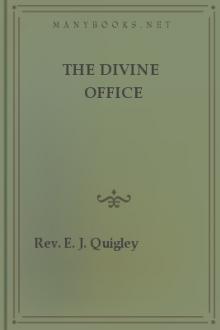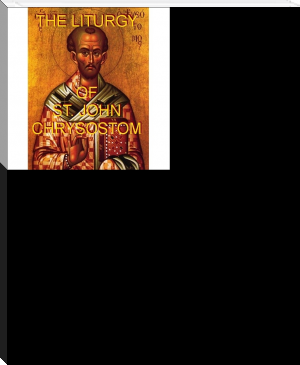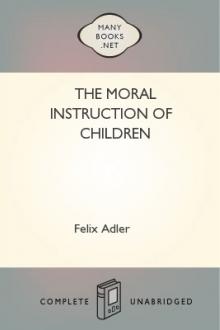The Divine Office by Edward J. Quigley (cool books to read .txt) 📕

- Author: Edward J. Quigley
- Performer: -
Book online «The Divine Office by Edward J. Quigley (cool books to read .txt) 📕». Author Edward J. Quigley
These antiphons have formed the theme of the oldest Christian poem in Europe—Cynewulf's "Christ," a work which is the admiration of modern scholars. They were celebrated with great pomp and joy in monastic life, the monks carrying their congruous symbolism into their recitation. For, to the gardener-monk was assigned, the chanting of "O Radix Jesse," and to the cellarer-monk, the "O clavis David"—typifying their work of root-growing and key keeping. (See The Month, No. 489; The Irish Ecclesiastical Record, December, 1918).
Christmas. Antiquity. "It was formerly taken for granted that Christ had actually been born on this day, and, accordingly, the learned were of opinion that the Church had observed it from the beginning, as the day of His birth. Even at the present day it will be dfficult for many to give up this idea. But there is no Christmas among the Christan feasts enumerated by Tertullian ([died] 220), Origen (185-254), and the recently published Testament of Jesus Christ. On the contrary, there is clear proof that even in the fourth and fifth centuries it was unknown in some parts of the Church, where its introduction, at a later period, can be proved historically" (vide Kellner, op. cit., pp. 127-158).
Christmas is one of the great festivals. In Rome there were two night Offices. The first, celebrated at nightfall in the Papal chapel, begins with the antiphon of the first psalm in the nocturn. It has nine lessons and the Te Deum. About midnight a more solemn Office began, this time with the invitatory and psalm Venite. The first of these Offices became the Office of the vigil.
In the Office of Christmas Day the lessons are read without the title of the book (Isaias) from which they are taken, because their author's name was so often repeated during the Advent that each one knew their source, or because at Christmas God speaks to us by His Son, rather than by His prophet. In the first response the Gloria Patri is said, to thank God for the great favour He has bestowed on us—His Son, the Christ. In the third nocturn, Alleluia is added to the antiphons, because the third nocturn typifies the time of grace, in which we should express the joy that is ours in the birth of the Saviour. In this nocturn, too, are given three Gospel extracts, corresponding with the Gospels in the Mass of Christmas. Matins are separated from Lauds by the first Mass because, it is said at midnight, and Lauds is a day Office. At Prime the versicle of the little response is Qui natus est.
Rubrics. Christmas is a primary double of the First Class. The third of the new Tres Tabellae (S.C.R., January, 1912) in the new Breviaries gives the rules for concurrence of Vespers in the Octave of Christmas.
Feast of St. Stephen. The worship of St. Stephen may be said to be as old as the Church herself, since St. Paul gave him the title of Martyr of Christ (Acts XXII. 20). His name is to be found in the earliest liturgical sources, e.g., the Arian martyrology belonging to about 360 and in all calendars, ancient and modern, excepting the Coptic. His cultus received great impulse from the discovery of his relics at Kaphar Gamala, on the shore of Lake Genesareth, and the wonderful miracles wrought by them, A basilica in his honour was erected, in Rome in the fourth century.
St. John the Apostle. The commemoration of St. John on the 27th December was formerly united with that of St. James the Less. In time, St. John's feast only was celebrated on this date, and such was the case as early as the time of Bede.
The Circumcision. This festival was originally called Octava Domini, and hence it may be inferred that it was not an independent festival and passed unnoticed if it fell on a week day. Thus, in the Homilarium of Charlemagne (786) it is referred to by this name. But very shortly after this, the name which we now use for the festival of the 1st January was used in Rome, and spread through the Church. In the early days of Christianity the first day of the civil year was given over to rejoicings, dancing, feasting and rioting. And these abuses lingered in France, though stripped of their pagan character, until the later middle ages. A remnant of them is found in the so-called Feast of Fools, which was held in churches, and which mocked several religious customs and ceremonies. These feasts lasted till the middle of the fifteenth century.
Epiphany. The name is derived from a Greek verb employed to describe the dawn, and the adjective derived from the Greek verb was applied in classic Greek, to the appearances of the gods bringing help to men. In Christian liturgy, the feast was instituted to celebrate the appearance, the manifestation of Christ, to the Gentiles, in the persons of the Magi. In later times, there were added to this commemoration of Christ's manifestation to the Gentiles, two further commemorations of his wonderful showings of His divine mission, viz., His manifestation in His baptism in the Jordan, a manifestation to the Jews, and His miracle at Cana, a showing forth to His friends and disciples. This feast is of early origin. Suarez thinks it should be attributed to the Apostles (De Relig. L.2. ch.5, n.9); and Benedict XIV. held that it was established by the infant Church at Rome to draw off the Christians from the profane and sinful revelry which marked the pagan feast of this date. However, these statements are hardly accurate. "With regard to the antiquity and spread of the feast, it was unknown in North Africa during the third century, for Tertullian makes no reference to it; and even in the time of St. Augustine, it was rejected by the Donatists as an oriental novelty. In Origen's time, at least, it was not generally observed as a festival in Alexandria, since he does not reckon it as such. For Rome, evidence is wanting for the earliest times, but since the daughter Church of Africa knew nothing—of the festival at first, it may be inferred that originally it was not kept at Rome, but was introduced there in course of time. In Spain it was a feast-day in 380, in Gaul in 361 …" (Kellner, op. cit., p.172).
In the antiphons for the Magnificat and the Benedictus it may be noticed that the three manifestations are given not in the same order. "This day is the Church united to the Heavenly Spouse, for Christ, in the Jordan, washes away her sins; the Magi run to the royal nuptials with their gifts, and the guests of the feast are gladdened by the water changed into wine" (Ant. of Benedictus). The Magi, seeing the star, said to each other: "This is the sign of the King: let us go and seek him, and offer him gifts, gold, frankincense and myrrh" (Ant. of Magnificat, 1st Vesp.), "We celebrate a festival adorned by three miracles: this day, a star led the Magi to the manger; this day water was changed into wine at the marriage feast; this day Christ vouchsafed to be baptised by John, in the Jordan of our salvation" (Ant. of Magnificat, 2nd Vesp.). Now, the baptism is the special event commemorated by the Easterns on this feast, and on account of its connection with the baptism, this feast has, amongst the Greeks, the secondary title of the feast of lights. And, in Ireland (Synodus II., St. Patricii, can. 20), contrary to the ancient custom of the Church, solemn baptism was administered on this feast day. This subject of the baptism forms the only theme of the ancient sermons bearing on this feast. On the other hand, the visit of the Magi is the sole event commemorated by St. Augustine in his six sermons delivered on this feast day. The third event, the marriage feast, is of later commemoration; and Maximus of Turin doubted if they all actually happened on the same day.
The Octave to the feast dates from the eighth century. It was customary on this date, in the Eastern Church, to read publicly the epistola festalis of the Patriarch of Alexandria arranging the date of Easter and the practice was ordered by the fourth Council of Orleans in 541.
In Epiphany the invitatory is not said in the beginning of Matins, in order, say the liturgists, not to repeat the inquiry made by Herod from the scribes about the birthplace of Christ, an inquiry and invitation inspired by hatred and anger. The invitatory is omitted, they tell us, that we, like the Magi, may come to Christ, without other than a silent invitation. Teachers of olden time used to urge those who were slow to believe to imitate the Magi. But, the invitatory is not quite omitted. It is read in the third nocturn, which typifies the law of grace, in which the Apostles and their successors invite all to praise and worship God. The psalms of the feast are taken from the psalms of each day of the week, but chiefly from Friday's psalms, perhaps because the Magi's visit was on that day.
SEPTUAGESIMA."During the age of the persecutions it was scarcely possible for Christians to observe any other festival than Sunday, and so it is not surprising that the two writers who have occasion to speak of the institution of the festivals of the Church, mention only Easter and Pentecost, both of which fall on a Sunday. To these Christmas was added in the fourth century and Epiphany somewhat earlier. These chief festivals, along with others soon added to their number, formed the elements for the organisation of a festal system in the Church, as centres round which the lesser festivals grouped themselves. The last step of importance, however, in the development of the Church's year was to connect these chief festivals with one another, so as to make them parts of a whole. The Sundays afforded a convenient means for effecting this. They were associated with the festal character of the nearest feast and were connected with it as links in a chain. The way for this development had been prepared by the season of preparation for Easter, and the Sundays in the fifty days between Easter and Pentecost— Quinquagesima—were marked with the festal character with which antiquity invested the whole period. All that was needed was, first of all, to connect Christmas, Easter and Pentecost; and, in the second place, the institution of a season of preparation before Christmas. This was accomplished between the sixth, and the eighth centuries.
"During the first six centuries the ordinary Sundays of the year had neither liturgical position or character, since they were not even enumerated. There was a sort of





Comments (0)